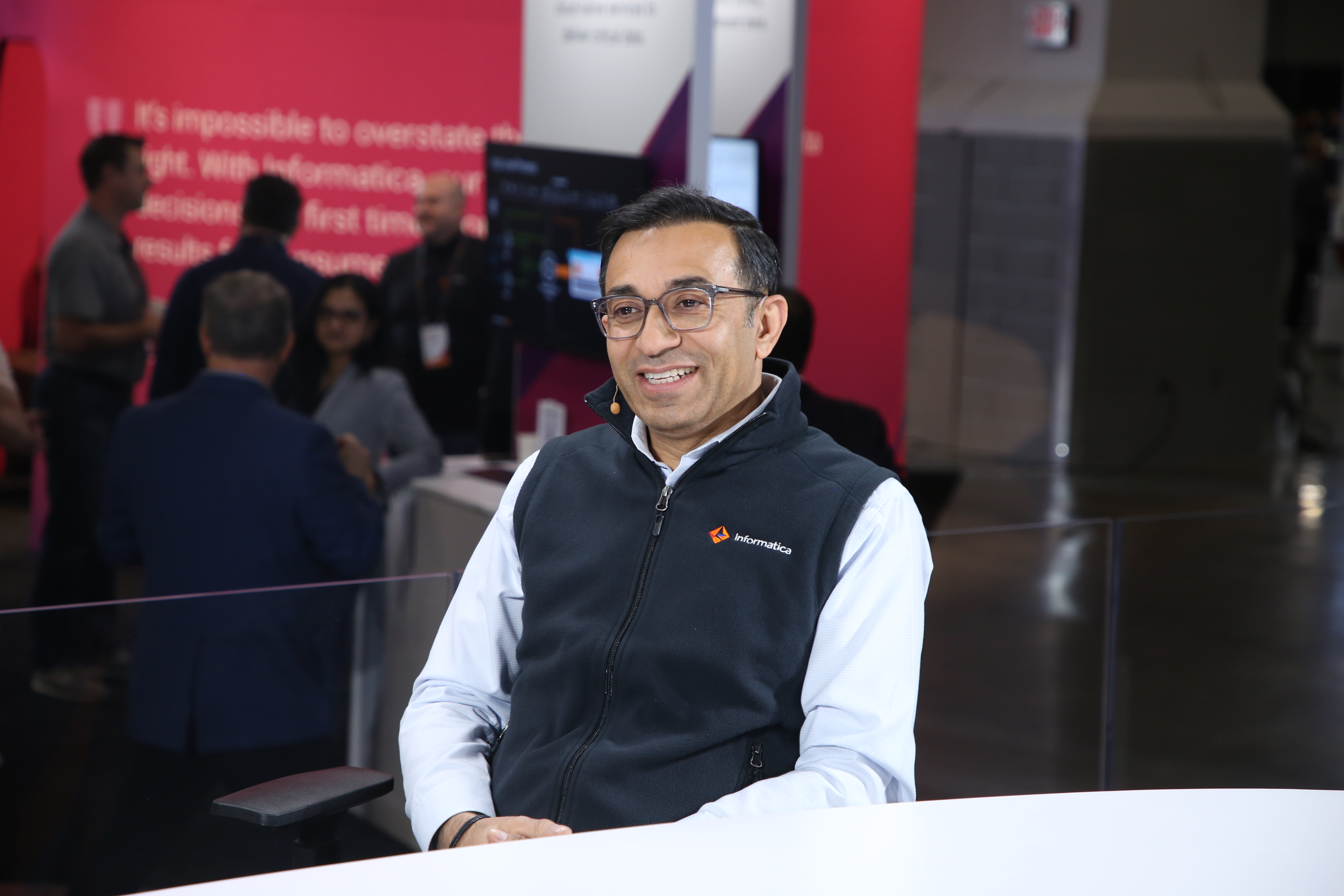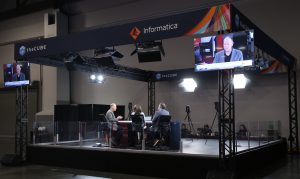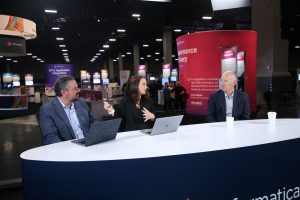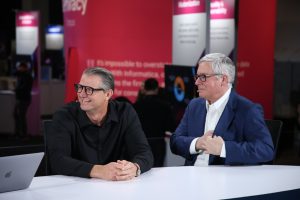 AI
AI
 AI
AI
 AI
AI
The battle for enterprise AI dominance is heating up, and companies such as Informatica Inc. have been seeking to capitalize. At this year’s Informatica World, executives, companies and partners weighed in on how best to stand out with data platform services.
Planned announcements from Informatica were a key area of interest. The event was a chance to hear more from executives about the company’s vision, how important partners are and how customers are leveraging technology to move AI strategies forward, according to theCUBE Research principal analyst Rob Strechay.

Rob Strechay and Rebecca Knight of theCUBE announced the latest announcements coming out of Informatica World 2024.
“You talk about a company that was hit hard during the pandemic and all of this, and how they’ve come back and really providing and focusing on better customer experiences through data,” he said. “Being able to get to AI faster, how you do that without having to have all these expertise … that was the simplicity message that they tied throughout.”
Analysts for theCUBE, SiliconANGLE Media’s livestreaming studio, spoke with information technology professionals, developers, customers and analysts during the event. They explored use cases in Informatica’s approach to data management and methodologies for database operations, sustainability and cloud modernization. (* Disclosure below.)
Here are three key insights you may have missed from the Informatica World event:
There were a number of big announcements and refinements announced at Informatica World, but one of the most notable was the news of CLAIRE GPT. It’s all part of the company’s hopes to streamline data management.
CLAIRE GPT is intended to take the toil out of data wrangling. It was effective how the company combined demos and showed how CLAIRE GPT worked, including how one could really easily get to a RAG infrastructure for AI using their designer, according to Strechay.

Throughout Informatica World, theCUBE analysts dove deep into all the latest news and product announcements.
“Being able to actually just take out doing the fictitious claims processing, take out a manual step, put a vector database in and your LLM in there to do some AI,” Strechay said. “I really liked the fact that they talked about a lot of the guardrails in governance and how the rubber meets the road of AI.”
This era of generative AI is just beginning, but will have a massive impact on the cognitive load and problems people have with their jobs, according to theCUBE co-host Rebecca Knight. The event also made a point of noting the importance of engaging business.
The event included a case study from Royal Caribbean that illustrated AI’s practical applications in improving customer experiences. That included a conversation on the main stage about the four ‘C’s, according to Knight.
“Clarity, connecting the dots … change management, and fourth is continuous learning. These are all really sort of big-picture leadership stuff we’re talking about,” Knight said. “Of course, it’s the technology too, but it is all of the steps involved in really making fundamental shifts in how companies do business. I think, as you said, this can’t get lost in the fact that this is all to the end of trying to improve the customer experience and build loyalty.”
The event also included conversation around how to drive an equitable future for AI and included speakers from the United Nations, DFW Airport and The Chubb Corp. It was a keynote for the ages, according to Knight.
“It was four very impressive women up there talking … about their careers, about biases they faced early on and how they broke through. Really impressive,” she said. “But I also thought the way they talked about technology and the way they talked about this moment in time that we’re living through was really interesting.”
Here’s theCUBE’s complete Day 2 keynote analysis segment:
In the face of AI, the data storage landscape has changed. But it was broadly understood by those at Informatica World that AI is only going to be successful if one manages the data, according to Graeme Thompson, chief information officer of Informatica.

TheCUBE’s Rob Strechay and Rebecca Knight talk with Informatica’s Graeme Thompson about data management.
“That’s why these people are here at our conference this week,” he said. “But think about all the other people that aren’t here and all the companies that haven’t even started to think of this; they’re the ones that I would worry about if I was a customer or a stakeholder in those companies if they’re not thinking about how to get their data ready.”
It’s crucial to navigate the AI data maze, according to Thompson. But it’s also important to remember that one needs to safely implement AI models.
“We have to caution ourselves and think that, OK, ChatGPT is built on top of the internet. You could argue that the internet is a reasonable proxy for the general knowledge of the world,” Thompson said. “But if you reflect on how that is going to translate to an enterprise use case, my data’s not on the internet. Google hasn’t been organizing it for 20 years. Most company’s enterprise data is a mess. It is as far from ChatGPT on the internet as you can possibly imagine.”
With the challenges in mind, Informatica has sought to position itself to get customer data ready for generative AI. Given that AI models are not intelligent on their own, one has to give it complete holistic data, according to Amit Walia (pictured), chief executive officer of Informatica.
“You want to give it good quality data; you want to have governance on top of that data. All of that stuff is data management. At the end of the day, that’s what we do as a living,” Walia said.
Here’s theCUBE’s complete video interview with Amit Walia:
Informatica World was also a chance to hear what the company’s partners are excited about. It included conversations about how generative artificial intelligence might bring capabilities to other industries, including healthcare.
More than 80% of meaningful healthcare data is captured in free text, according to Richard Cramer, chief strategist of healthcare and life sciences at Informatica Inc. That’s inaccessible, and it’s something that generative AI can help summarize.

Informatica’s Richard Cramer and Microsoft’s Austin Walsh discuss how generative AI can bring capability to healthcare during .
“[It’s a huge] opportunity to take those huge volumes of text and create meaningful, consumable clinical summaries for a clinician … that you otherwise couldn’t have,” Cramer said.
As companies seek to enhance AI capabilities through managing and utilizing data on-premise and in the cloud, strategic partnerships become key. The partnership between Informatica and Amazon Web Services Inc. has sought to advance the companies’ joint efforts in data management, AI integration and customer-centric innovation.
“Our customers, joint customers, are thrilled that they’re able to adopt and adapt to Informatica on the cloud marketplace with AWS,” said Sri Raghavan, principal, data science and analytics, Amazon Marketplace at AWS. “It’s a fantastic partnership, years in the making. The momentum has increased significantly and we’re thrilled with this relationship.”
Another strategic partnership was announced between Informatica and Oracle Corp. two years ago. Today, as Informatica’s Intelligent Data Management Cloud has been brought to Oracle Cloud Infrastructure, the question becomes what the foundation should look like in the cloud for modern analytics, according to Rik Tamm-Daniels, group vice president of technology alliances at Informatica.
“We got together and said, ‘instead of giving customers dozens and dozens of choices, and they have to figure out what they’re doing, we’re going to put our heads together and [find] the right solution for customers to get to the end state,’” Tamm-Daniels said. “In the era of generative AI, we’ve been doing exactly the same thing, building out those templates and roadmaps to help customers on that journey.”
Here’s theCUBE’s complete video interview with Tamm-Daniels and Neil Mendelson, vice president of big data and advanced analytics at Oracle:
To watch more of theCUBE’s coverage of the Informatica World event, here’s our complete event video playlist:
(* Disclosure: TheCUBE is a paid media partner for Informatica World. Neither Informatica, the sponsor of theCUBE’s event coverage, nor other sponsors have editorial control over content on theCUBE or SiliconANGLE.)
THANK YOU